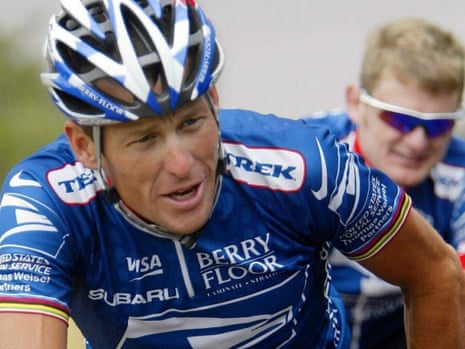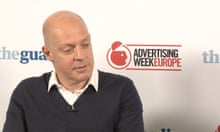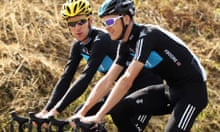And there we have it. What did we learn?
Travis Tygart does, in fact, want a truth and reconciliation process in cycling (I was wrong about how he'd be lukewarm on that).
Jonathan Vaughters is very optimistic about how clean the sport is, judging by his team's results and by the average speeds in races, which have declined to less “extraterrestrial” levels.
Floyd Landis didn't get to tell us his “gut” feeling about how clean the sport is. He has other regrets, too.
Travis Tygart seems like a stand-up kind of guy. And apparently, he's a soccer dad.
There was a former Yale University cyclist who got caught doping. That's not very smart.
Travis Tygart takes a question about the “trickle-down” of doping into the amateur ranks of the sport:
“The question is going to become, for amateur cyclists out there and for parents, at what point are you going to pay for drugs to be successful? Testing is one answer. In this win-at-all-cost culture, it has fundamentally changed what sport is about: when you put that much pressure on people, even good people will make bad decisions.”
We're onto our last question now:
“Is there any obligation on the part of race organisers to make races less insanely hard to mitigate against doping?”
Vaughters explains that it's not the difficulty of the races, how high the mountains are, how long the stages are, but the speed at which they're run.
When the panelists get up to leave the dais, we get to see his checked trousers. He's a dandy, our Johnny.
We get an audience question about the distinction between “norms” and “rules” – in other words, if doping is just part of the technological advance in the sport, why demonise and outlaw it? Hacker jumps in and says, for instance, how using a hypoxic chamber is different to using drugs, if the effect is to raise an athlete's red blood cell count. He goes to Professor Thomas Murray for the answer:
“Every sport has to figure out what are its own meaning and values. It's not written anywhere; it grows out of a common understanding of the people who know, love and do it.”
It's almost a romantic answer: “Rules have to underpin what the fundamental meaning of a sport is.”
Vaughters says:
“One thing you have to realise with doping is that different drugs have different effects on different people.”
He says this led to riders being tested and recruited if they had a naturally low red blood cell count – purely because that would leave so much room for improvement by doping. In other words, it wasn't even about talent, but just about being genetically susceptible to medication.
Landis talks about the stress he put a lot of people through on his long journey towards truth.
And now we move to a Q&A session. Landis explains first why he wanted to do this event – which was his idea.
“It is helpful to have some outside perspective. For those of us inside the sport, like Jonathan [Vaughters] and Travis [Tygart], we inside our bubble. It's helpful to have outside perspectives.
“And I just like sitting in front of an audience.”
That gets a round of laughter – and a pat on the back from Vaughters.
Landis is asked from the audience “what does his gut say how clean the sport now”. Before he gets to answer that Vaughters speaks to how he works to make Garmin-Sharp, the team he manages, doping-free. He explains that he has a mixture of ambitious youngsters and older, experienced riders who've seen the dark days of doping and don't want to go back there; they act as role models. But he says the message has to be right from the top: if he was to get just results-focused, “that would be crossing a line” – in other words, encourage his team to believe that he will turn a blind eye to doping as long as they start winning races.
“It's a tragedy that we will never get to know whether Floyd could have won the Tour de France clean. But he's got a lot to tell us, and that's why he's hear today.”
Another question goes to the “zero tolerance” approach to doping – which Team Sky has made controversial. Tygart says that the risk of that is that it's forcing people to lie or lose their job.
“It continues to foster the code of silence.”
Hacker asks Murray what the ethical rules governing anti-doping should be, in the light of the bringing down such a high-profile figure as Lance Armstrong.
“We had to have a system that was plausibly effective,” says Professor Murray, citing the “biological passport”. He says the athletes he encountered were incredibly frustrated:
“It became clear to me early on that athletes understand what works and what the culture is, and they want to be able to compete without cheating.”
Hacker raises the question of how effective the anti-doping regime is. He reminds us that riders have been very quick in the past to figure out that they can dodge tests, for example, by micro-dosing EPO and using transfusions.
Vaughters goes to a science lesson to talk about the decline in speed and riders' watts per kilo. There's a nice graph that shows that the speed the Tour climbed the Alpe d'Huez in 2011 was back down almost to the level that Greg LeMond was at in 1987: in other words, it looks like the top riders' performance is no longer distorted by drugs.
“Right now, we're in a really good spot. The question is how do we keep it that way.”
Travis issues a note of caution about seeing “blips in good behaviour”:
“I think we still need a bold and courageous move towards a truth and reconciliation process. If you were in the sport and doped and never got caught, you're no in positions of management and coaching, you're more likely to enable more doping.”
Hacker asks Tygart is cycling has a particular problem with doping. Tygart responds:
“It was very easy for otherwise good people to rationalise taking drugs. We have to shatter the culture that enabled that. Make no mistake, the win-at-all-costs culture that creates that environment I see in my 9-year-old son in his soccer matches.
“There were victims. There were people within that culture and didn't do it. And there were people who had a chance to be in that sport, but walked away. For whatever reason, their upbringing, their ethics, they didn't go down that path. We have to find a way to protect them.”
Tygart sounds the most evangelical about the cause of making sport doping-free. He gets a round of applause for it.
Thomas Murray observes that in baseball, for instance, cheating is an accepted, even admired part of the game. But he says in cycling, it was different – “it was heinous: because it started an arms race that was so destructive”. He recalls that East Germany had over a hundred specialists working on state-sponsored doping before the Berlin Wall came down, then they dispersed, to China and elsewhere: “If the ecosystem is enabled, it just moves elsewhere.”
Hacker moves to talk about Armstrong – “the alpha male in that ecosystem”.
Vaughters explains that he retired at 29 – an age when a cyclist would normally be at the peak of his career, with several more good years: “I was tired of wrestling with my conscience every day of my life.”
He describes talking to Sunday Times journalist David Walsh, who told him in 2003: “You know, some day you're going to have to tell the truth about all this.”
Vaughters fast-forwards to 2010 and Floyd Landis's confession.
“When I saw him getting attacked personally, I saw that when things have gone too far, we just have to tell the truth.”
It was therefore Landis's bombshell that prompted Vaughters to contact Travis Tygart pro-actively. Landis jumps in to explain his gradual evolution toward coming clean about doping.
“In my mind, there wasn't a good way to admit to doping for my entire career and have the question end there … But I didn't have a clear way in my mind to reverse myself and tell the truth.” He did, of course, fight his doping suspension for a year and a half after his positive test in 2006.
Thomas Murray is up first, explaining why drugs in sport are unacceptable. He says that athletes told him simply that the drugs worked – and this was in the era before blood-doping, when performance-enhancing drugs were simply steroids and stimulants. That poses the question, he argues, of what meaning and fulfilment we look for in sport.
Hacker goes to Travis Tygart:
“Drugs artificially enhances performance. They're prohibited in a rule-based system. They're also hazardous to health. Safety is one of the main concerns.
“If we don't use our best efforts to ensure that athletes are competing on a level playing field. Doping challenges whether cycling or any other sport going to maintain the essence of what it's supposed to be about.”
Jonathan Vaughters recalls that cycling in its first decade was an entertainment.
“I think cycling has taken a while to catch up. The culture has not caught up to a new ethos. But up until the 1990s, the drugs were not that effective. All of sudden, with the advent of EPO, you have this drug that is so incredibly effective in enhancing performance.
“It became essentially obligatory to use the drug at the highest level in the sport to be competitive. Where we went wrong was in the reaction time. People weren't talking about this as a huge problem in 1995, 1996. It wasn't being acknowledged publicly.”
Floyd Landis now has his first words. He's asked about something he said to Irish journalist Paul Kimmage – that if he had to do it all over again, he'd do just as he did, but admit it straight away.
“If I wanted to pursue my goal of winning the Tour de France and have any chance of doing so, it was clear to me that the majority of cyclists were using drugs, it was either do it or accept that I would never achieve my goal.
“I would prefer to change the circumstances and not ever find myself there in the first place.”
So we've started with a film intro of highlights – or rather, low points – of cycling's doping shame of the last decade: from the Festina affair, to Operacion Puerto, Marco Pantani's exclusion from the Tour, Floyd Landis's own doping bust, Tyler Hamilton's CBS “60 Minutes” expose and, of course, Lance Armstrong's lifetime ban. So, that is the context established.
With that, Jacob Hacker, tonight's chair and director of Yale's Institution for Social and Policy Studies, is up. He says he's a cyclist, too – did I mention?
Hacker sets out the agenda. How did we get here? How effective is the anti-doping regime? And where do we go from here in the battle for clean sport?
As for Travis Tygart … it's probably too much to expect anecdotes from him about staring down Lance Armstrong, but it will be interesting to see how this formidable and dogged operator conducts himself in public. If I could ask the questions, I'd want Tygart's read on how Armstrong has played his hand since the moment he turned down the chance to rebut Tygart's case in the formal setting of a court of arbitration for sport.
To me, Armstrong has remarkably little to show for abandoning his strategy of “never explain, never apologise” blanket denial; all he's done is make the various multimillion-dollar lawsuits against him – including now the feds' – harder to defend.
I am sure he'll also address the proposal for a truth and reconciliation process for cycling – but since this is an idea both Armstrong and his former allies at the UCI have paid lip-service to, it's hard to see Tygart expressing much enthusiasm for what would essentially grant an amnesty to lots of people he'd like to question under oath.
And not forgetting Jonathan Vaughters, one of today's other two panelists. If you follow him on Twitter, you'll know that Vaughters is refreshingly candid and outspoken on most matters. As a member of Armstrong's 1999 Tour-winning team, he was an important witness for Tygart.
And even before l'affaire Landis, Vaughters was a strong advocate of doping-free cycling: in recent years, he's not only talked the talk, but shown that there's a premium in running truly clean teams – even as many big sponsors were baling out of the sport because of the PR liability of doping scandals. With a bit of luck, he'll spark this panel to life if it threatens to get dull and worthy.
I'm sure we'll also hear from both Vaughters and Tygart on how clean they think cycling now is, in the wake of all the recent revelations. And no doubt, the fourth guest on the panel – Wada's bioethics expert, Professor Thomas Murray – will chip in with where we are in the arms race between the cheats and testers.
Yale promises that the event is being livestreamed here. If you're following the discussion there or reading this live blog, please tweet your comments with the hashtag #LandisatYale. Or comment below. I'll be looking out for your reactions and pulling them in as we go.
So, what's at stake in this discussion? What are the central issues we might hope will get aired?
The most obvious area of interest is that Landis's appearance comes just one week after the US Justice Department announced that it was joining Landis's lawsuit against Armstrong and his business associates. The suit alleges that the USPS team's organised doping scheme meant that the US Postal Service – a federal enterprise, backed by public money – was defrauded. How much can Landis say about this lawsuit?
He probably will not want to uncover too much about the arguments his attorney, and now the DOJ, will be making in court, but he must have a massive sense of vindication that the feds have now backed his case. Given this development, I would love to know why he believes the original federal investigation into this issue was halted in 2011 and did not go forward to prosecution.
That other vital Usada witness against Armstrong, Tyler Hamilton, has speculated that Lance used his political connections to get it closed down. There's no evidence of that, and it probably attributes too much omnipotence to Armstrong, but still, I wouldn't mind getting Landis's take on it.
Besides that, what else?
Well, of course, we would love to know just why Landis sent those emails in May 2010 that blew a hole in Lance Armstrong's alibi for what Tygart has called the “greatest heist” in the history of cycling.
Was it pique at being left out of the Tour of California and cold-shouldered by Armstrong's RadioShack team? Was it out of a desire to bring down cycling's omertà, by which you were expected to dope and not question its ethics, but if you were caught, it was understood that you were on your own?
Or was it righteous anger that the biggest dope-cheat of them all was just going to go on getting away with it, unless someone – Landis – finally told the whole truth and damn the consequences?
Of course, we might get none of that. We might just hear the usual bromides and handwringing about doping in sport and cycling's governance problems. I'm not knocking that: it is important stuff. But I hope for more – especially as I note that the panel's moderator is not just a Yale academic but a keen amateur bike racer. They're everywhere these days, you know.
Welcome to our live coverage of the panel discussion “Spinning Our Wheels: Doping in Professional Cycling”, hosted by Yale University law school and starting at 4.30pm ET (9.30pm GMT).
In the wake of the past months' drama over Lance Armstrong, you could be excused for thinking that a debate in the august setting of an Ivy League college might be a bit geeky and tame. But here's why it shouldn't be dull and academic. This afternoon, we get a rare opportunity to hear from people who have been absolutely key players in the story of Armstrong's great undoing: Floyd Landis and Travis Tygart.
For a fuller run-down on the participants in the Yale panel, here's one I made earlier. But shorter: without Floyd Landis's 2010 bombshell confession, implicating the entire US Postal Team (for which he rode for from 2002 to 2004) in a systemic doping program, the likelihood is that Lance Armstrong would still be sitting pretty – with his seven Tour wins intact and a still lucrative career ahead as a masters triathlete and ambassador for Livestrong.
And without the US Anti-Doping Agency's chief executive, Travis Tygart, then moving to capitalise on those revelations with a rigorous pursuit of all the evidence forced into view by Landis's whistleblowing, Landis himself might have been just another washed-up former cyclist, tainted by his own doping suspension and dismissed by Armstrong as a non-credible and self-serving witness.
Floyd Landis, especially, has kept a low profile since 2010. This is his first truly public appearance – certainly since Armstrong was stripped of his titles and Usada's report on doping in the US Postal and Discovery Channel teams was published last year. I, for one, am fascinated at the prospect of hearing from Armstrong's nemesis. There's a lot he might shed light on.
PS not sure about the “Spinning Our Wheels” tagline for this event. That's when cars get stuck, right? As someone once said, it's not about the bike. Maybe “On the Skids …”? Suggestions below, please.



Comments (…)
Sign in or create your Guardian account to join the discussion